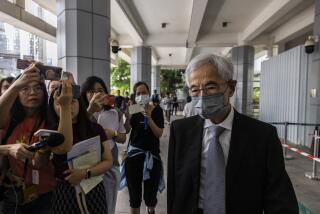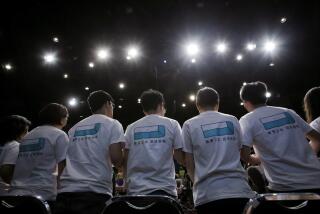China police show up en masse at hint of protest
In military terms, it might be called a disproportionate preemptive strike, one that underscored how nervous the Chinese government is about pro-democracy demonstrations taking place thousands of miles away in the Middle East.
The merest whiff of protests in Beijing and elsewhere in support of the so-called jasmine revolution brought out a massive showing of paramilitary, uniformed and undercover police Sunday.
The calls for demonstrations in 13 Chinese cities apparently originated on a Chinese-language U.S.-based website called Boxun.com and spread rapidly over Twitter and other microblogging services. One typical posting called on people to “participate in demonstrations, shout slogans and seek freedom, democracy and political reform to end one-party rule.”
By 2 p.m. Sunday, hundreds of people had gathered in front of a McDonald’s on Wangfujing, a pedestrian tourist mall, near Tiananmen Square. But in the throngs gathering at one of the most crowded venues in Beijing, it was impossible to distinguish curiosity seekers from actual demonstrators.
Three people were taken away by police, who also questioned a young man who laid white flowers, apparently a reference to jasmine, on a planter in front of the McDonald’s and tried to photograph them with his cellphone.
In Shanghai, another three people were detained after a skirmish in front of a Starbucks, the Associated Press reported.
Wan Yanhai, an AIDS activist who fled to the United States last year because of political repression, said that many of the prominent activists he knows were reluctant to be involved and even refrained from re-tweeting messages about the demonstrations. The anonymous postings, he said, first appeared about 10 days ago, and the location of the planned protests was announced Saturday.
“Maybe it was a joke. Maybe it was performance art. Maybe it was an intelligent political plan, but nobody knows,” Wan said. “Most of the prominent activist groups hesitated to push these demonstrations.”
According to Wan, university students in many provincial cities were told Sunday that they should not leave campus for fear that they might be heading toward the protests.
Before the call for demonstrations, Chinese authorities detained or put under house arrest as many as 100 people, according to the Hong Kong-based Information Center for Human Rights and Democracy. They include well-known lawyers and human rights activists. Some of them were taken into custody after a meeting last week to dicuss the plight of Chen Guangcheng, a blind activist who is being held prisoner in his home in rural Shandong province.
“Police actions have ostensibly been carried out to prevent activists from helping Chen Guangcheng, but at a deeper level, the reason is Egypt, Tunisia, and the flower revolutions,” the Hong Kong-based rights center quoted one of the lawyers saying.
The Chinese government has tried to restrict coverage of the uprisings across the Middle East for fear of comparisons between its own one-party system and those that are now being challenged by restive citizens. Searches for the words “jasmine” and “Egypt” are blocked on many websites.
At a seminar on Saturday in Beijing, President Hu Jintao called on high-level cadres to “solve prominent problems which might harm the harmony and stability of society,” according to the Chinese state media. The speech has been widely interpreted as a sign that the Chinese government intends to tighten its controls over the media and Internet.
More to Read
Start your day right
Sign up for Essential California for news, features and recommendations from the L.A. Times and beyond in your inbox six days a week.
You may occasionally receive promotional content from the Los Angeles Times.






